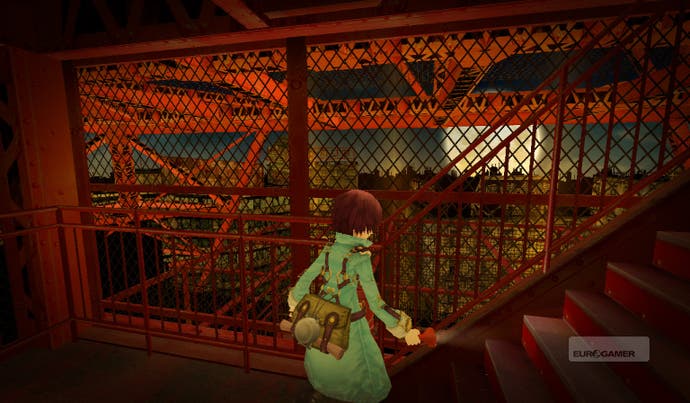Fragile Dreams: Farewell Ruins of the Moon
Night terrors.
The main story itself is vivid and interesting, and doesn't shy from sorrow. You soon learn that no character with whom Seto forms a relationship is beyond being stolen from you, and there are numerous Aeris-esque shock moments in the game. However, there's also a tenderness to the narrative, one that demonstrates the game's writers were aiming for something more than mere surprise with their twists and tragedy.
Less successful are the systems that fire the game. The puzzles are generally tedious, and the item management, which has you arranging items in a cramped, Resident Evil 4-style inventory, is fiddly. Survival horror games are always as much about coping with a scarcity of resources as they are about jumps in the dark, but Fragile Dreams' economy is so weighted toward the player that you'll never find yourself unable to afford a new weapon or bag of health-restoring sweets.
Nevertheless, as in RPGs of yore, your weapons constantly degrade, eventually breaking and becoming useless. So you must endure the hassle of keeping and managing standby fresh weapons at all times, with none of the real jeopardy in learning when to hold back attacks - frustrating, as there's no indicator of the durability of your weapon.

The combat system, too, is poor, with no lock-on to aim your swipes. Too often you'll find yourself in an awkward dance with a foe, wrestling the camera into position to strike while simultaneously backtracking to avoid their attacks. There's no flow, the staccato rhythms seeming antiquated, even if, perhaps, they are realistic.
The puzzles, most of which are introduced by a stylish but invasive tutorial, are simplistic and clunky in execution. More problematic is that they often lack imagination. Breaking crates to find a path through a storehouse is never going to be an enjoyable or engaging pursuit, no matter how well executed the interaction or compelling the prize at the end of it.
Even so, the game's eager use of the Wiimote's functions pay more than mere lip service to the hardware's capabilities. Listening for clues through the controller's tinny speaker, or lifting it to your ear in order to trigger a piece of advice on where to get next, are neat touches and sit well with the overall ambiance.
Somehow less than the sum of its parts, Fragile Dreams fails to match its ambition with its systems and imagination. To call it a flawed gem would be too generous, as the problems run too deep and critical to make this an engaging proposition for any but the most patient and forgiving of players. But it seems churlish to put the boot in too, as there's something fragile and beautiful at the game's core: a vision that's worthy of celebration, but one that's ultimately obscured by its maker's shortcomings in realising it.








